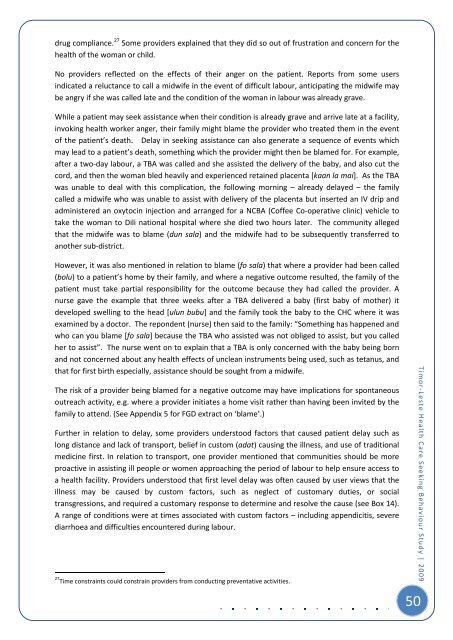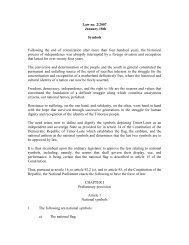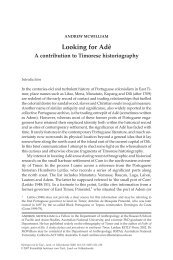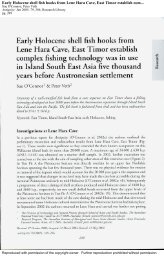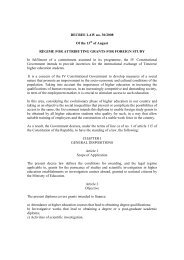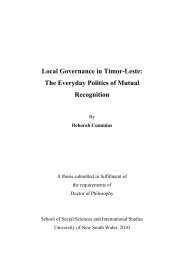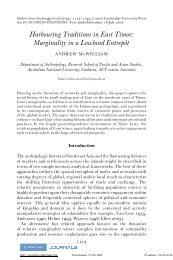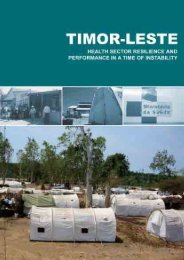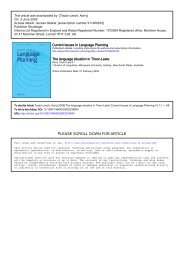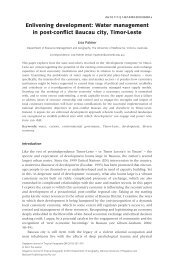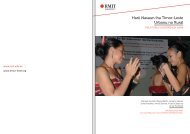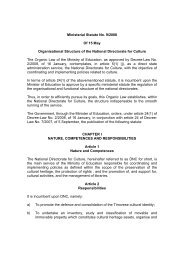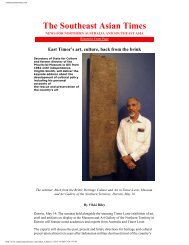Timor-Leste Health Care Seeking Behaviour Study - Secretaria de ...
Timor-Leste Health Care Seeking Behaviour Study - Secretaria de ...
Timor-Leste Health Care Seeking Behaviour Study - Secretaria de ...
- No tags were found...
Create successful ePaper yourself
Turn your PDF publications into a flip-book with our unique Google optimized e-Paper software.
drug compliance. 27 Some provi<strong>de</strong>rs explained that they did so out of frustration and concern for thehealth of the woman or child.No provi<strong>de</strong>rs reflected on the effects of their anger on the patient. Reports from some usersindicated a reluctance to call a midwife in the event of difficult labour, anticipating the midwife maybe angry if she was called late and the condition of the woman in labour was already grave.While a patient may seek assistance when their condition is already grave and arrive late at a facility,invoking health worker anger, their family might blame the provi<strong>de</strong>r who treated them in the eventof the patient’s <strong>de</strong>ath. Delay in seeking assistance can also generate a sequence of events whichmay lead to a patient’s <strong>de</strong>ath, something which the provi<strong>de</strong>r might then be blamed for. For example,after a two-day labour, a TBA was called and she assisted the <strong>de</strong>livery of the baby, and also cut thecord, and then the woman bled heavily and experienced retained placenta [kaan la mai]. As the TBAwas unable to <strong>de</strong>al with this complication, the following morning – already <strong>de</strong>layed – the familycalled a midwife who was unable to assist with <strong>de</strong>livery of the placenta but inserted an IV drip andadministered an oxytocin injection and arranged for a NCBA (Coffee Co-operative clinic) vehicle totake the woman to Dili national hospital where she died two hours later. The community allegedthat the midwife was to blame (dun sala) and the midwife had to be subsequently transferred toanother sub-district.However, it was also mentioned in relation to blame (fo sala) that where a provi<strong>de</strong>r had been called(bolu) to a patient’s home by their family, and where a negative outcome resulted, the family of thepatient must take partial responsibility for the outcome because they had called the provi<strong>de</strong>r. Anurse gave the example that three weeks after a TBA <strong>de</strong>livered a baby (first baby of mother) it<strong>de</strong>veloped swelling to the head [ulun bubu] and the family took the baby to the CHC where it wasexamined by a doctor. The repon<strong>de</strong>nt (nurse) then said to the family: “Something has happened andwho can you blame [fo sala] because the TBA who assisted was not obliged to assist, but you calledher to assist”. The nurse went on to explain that a TBA is only concerned with the baby being bornand not concerned about any health effects of unclean instruments being used, such as tetanus, andthat for first birth especially, assistance should be sought from a midwife.The risk of a provi<strong>de</strong>r being blamed for a negative outcome may have implications for spontaneousoutreach activity, e.g. where a provi<strong>de</strong>r initiates a home visit rather than having been invited by thefamily to attend. (See Appendix 5 for FGD extract on ‘blame’.)Further in relation to <strong>de</strong>lay, some provi<strong>de</strong>rs un<strong>de</strong>rstood factors that caused patient <strong>de</strong>lay such aslong distance and lack of transport, belief in custom (adat) causing the illness, and use of traditionalmedicine first. In relation to transport, one provi<strong>de</strong>r mentioned that communities should be moreproactive in assisting ill people or women approaching the period of labour to help ensure access toa health facility. Provi<strong>de</strong>rs un<strong>de</strong>rstood that first level <strong>de</strong>lay was often caused by user views that theillness may be caused by custom factors, such as neglect of customary duties, or socialtransgressions, and required a customary response to <strong>de</strong>termine and resolve the cause (see Box 14).A range of conditions were at times associated with custom factors – including appendicitis, severediarrhoea and difficulties encountered during labour.27 Time constraints could constrain provi<strong>de</strong>rs from conducting preventative activities.<strong>Timor</strong>-<strong>Leste</strong> <strong>Health</strong> <strong>Care</strong> <strong>Seeking</strong> <strong>Behaviour</strong> <strong>Study</strong> | 200950


